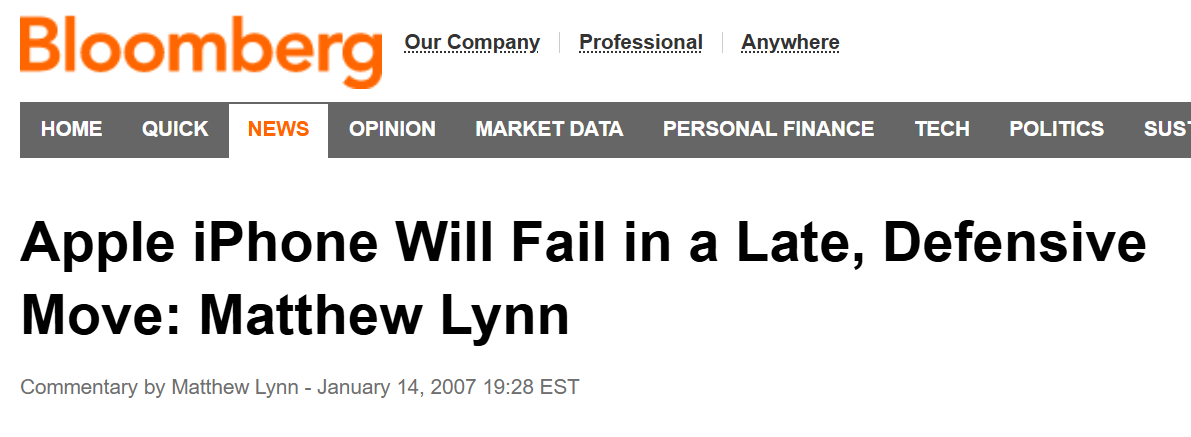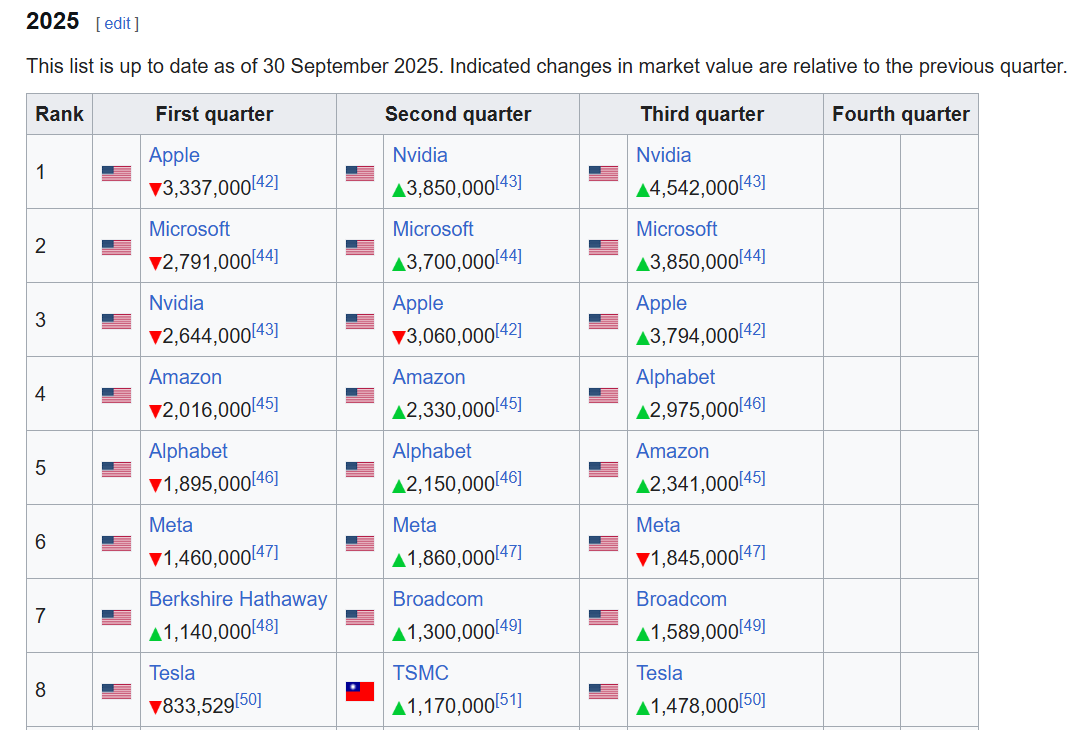Welcome to DU!
The truly grassroots left-of-center political community where regular people, not algorithms, drive the discussions and set the standards.
Join the community:
Create a free account
Support DU (and get rid of ads!):
Become a Star Member
Latest Breaking News
Editorials & Other Articles
General Discussion
The DU Lounge
All Forums
Issue Forums
Culture Forums
Alliance Forums
Region Forums
Support Forums
Help & Search
General Discussion
In reply to the discussion: Economists were wrong about tariffs. They need to figure out why. [View all]Celerity
(52,487 posts)52. the article

https://archive.ph/J2XY
Jan. 15 (Bloomberg) -- Few products have been launched with such a blizzard of publicity as Apple Inc.'s iPhone.
To its many fans, Apple is more of a religious cult than a company. An iToaster that downloads music while toasting bread would probably get the same kind of worldwide attention. Don't let that fool you into thinking that it matters. The big competitors in the mobile-phone industry such as Nokia Oyj and Motorola Inc. won't be whispering nervously into their clamshells over a new threat to their business. The iPhone is nothing more than a luxury bauble that will appeal to a few gadget freaks. In terms of its impact on the industry, the iPhone is less relevant.
If column inches and airtime guaranteed commercial success, Apple would already have a global hit on its hands. For the past week, it has been impossible to open a newspaper or look at a Web site without reading something about the shiny new phone. Certainly, it looks like a nice piece of equipment. The iPhone combines Apple's iPod music and video player with a mobile phone as well as having wireless Internet access for e-mail. Instead of lugging around a phone for making calls, an MP3 player for listening to music, and a Blackberry for checking your e- mail, you can do all three on one device. Even better, you only need one charger. It will be released in the U.S. in June, with a rollout to the rest of the world later, and will cost $499 to $599, depending on how much storage space you want. How many might they sell? Ten million in 2008, according to Apple Chief Executive Officer Steve Jobs.
Three Reasons
Not everyone is sold on the idea. ``The iPhone will not substantially alter the fundamental structure and challenges of the mobile industry,'' Charles Golvin, an analyst at Forrester Research Inc., said in a report this month. There are three reasons that Apple is unlikely to make much of an impact on this market -- and why it is too early to start dumping your Nokia shares.
First, Apple is late to this party. The company didn't invent the personal computer or MP3 player, but it was among the pioneers of both products. Yet there is no shortage of phones out there. There are already big companies that dominate the space, all of whom will defend their turf. That means Apple will have to fight hard for every sale. Next, the mobile-phone industry depends on cooperation with the big networks. Phones -- the high-end ones in particular --are usually sold with a network contract. The provider subsidizes the handset in the U.K. and hopes to recoup its money with ridiculously expensive charges for calls and data. Yet Apple has never been good at working with other companies. If it knew how to do that, it would be Microsoft Corp.
snip
It won't come from the iPhone. Apple will sell a few to its fans, but the iPhone won't make a long-term mark on the industry.
(Matthew Lynn is a Bloomberg News columnist. The opinions expressed are his own.)
To its many fans, Apple is more of a religious cult than a company. An iToaster that downloads music while toasting bread would probably get the same kind of worldwide attention. Don't let that fool you into thinking that it matters. The big competitors in the mobile-phone industry such as Nokia Oyj and Motorola Inc. won't be whispering nervously into their clamshells over a new threat to their business. The iPhone is nothing more than a luxury bauble that will appeal to a few gadget freaks. In terms of its impact on the industry, the iPhone is less relevant.
If column inches and airtime guaranteed commercial success, Apple would already have a global hit on its hands. For the past week, it has been impossible to open a newspaper or look at a Web site without reading something about the shiny new phone. Certainly, it looks like a nice piece of equipment. The iPhone combines Apple's iPod music and video player with a mobile phone as well as having wireless Internet access for e-mail. Instead of lugging around a phone for making calls, an MP3 player for listening to music, and a Blackberry for checking your e- mail, you can do all three on one device. Even better, you only need one charger. It will be released in the U.S. in June, with a rollout to the rest of the world later, and will cost $499 to $599, depending on how much storage space you want. How many might they sell? Ten million in 2008, according to Apple Chief Executive Officer Steve Jobs.
Three Reasons
Not everyone is sold on the idea. ``The iPhone will not substantially alter the fundamental structure and challenges of the mobile industry,'' Charles Golvin, an analyst at Forrester Research Inc., said in a report this month. There are three reasons that Apple is unlikely to make much of an impact on this market -- and why it is too early to start dumping your Nokia shares.
First, Apple is late to this party. The company didn't invent the personal computer or MP3 player, but it was among the pioneers of both products. Yet there is no shortage of phones out there. There are already big companies that dominate the space, all of whom will defend their turf. That means Apple will have to fight hard for every sale. Next, the mobile-phone industry depends on cooperation with the big networks. Phones -- the high-end ones in particular --are usually sold with a network contract. The provider subsidizes the handset in the U.K. and hopes to recoup its money with ridiculously expensive charges for calls and data. Yet Apple has never been good at working with other companies. If it knew how to do that, it would be Microsoft Corp.
snip
It won't come from the iPhone. Apple will sell a few to its fans, but the iPhone won't make a long-term mark on the industry.
(Matthew Lynn is a Bloomberg News columnist. The opinions expressed are his own.)

Edit history
Please sign in to view edit histories.
59 replies
 = new reply since forum marked as read
Highlight:
NoneDon't highlight anything
5 newestHighlight 5 most recent replies
RecommendedHighlight replies with 5 or more recommendations
= new reply since forum marked as read
Highlight:
NoneDon't highlight anything
5 newestHighlight 5 most recent replies
RecommendedHighlight replies with 5 or more recommendations
Two reasons: 1) Staggered changing tariffs smeared the effect. 2) Massive uncertainty. . . . . . nt
Bernardo de La Paz
Friday
#1
Matthew Lynn is a financial columnist and author. He writes for the Daily Telegraph and the Spectator in London.
Celerity
Friday
#15
He has a bachelor's degree in economics. I have one too. Neither one of us is an economist.
PeaceWave
Friday
#24
With all due respect, this feels like Republican propaganda. By all accounts, tariffs are punishing U.S. farmers.
PeaceWave
Friday
#6
This is BS because he backed off a lot of tariffs, or lowered them drastically.
OrlandoDem2
Friday
#21
This is an opinion piece written by a conservative writer who backed brexit and who gives TSF lots
wiggs
Friday
#25
The US economy was so strong it withstood a huge major grifting operation by Trump.
Irish_Dem
Friday
#27
This is the guy who predicted in a 2007 Bloomberg article that the iPhone would be a flop.
Ocelot II
Friday
#28
They haven't been fully implemented, and temporarily companies have been
lostincalifornia
Friday
#31
Why are we allowing right wing bullshit like this to be posted here? I thought it was against the rules.
Wiz Imp
Friday
#43
For those who thought that the author of this article was full of shit, but weren't sure, this should clinch it.
Wiz Imp
Friday
#50
Thank you for the having the courage to post this - at the risk of being flamed, I'm not surprised at all by this.
Midwestern Democrat
Friday
#57